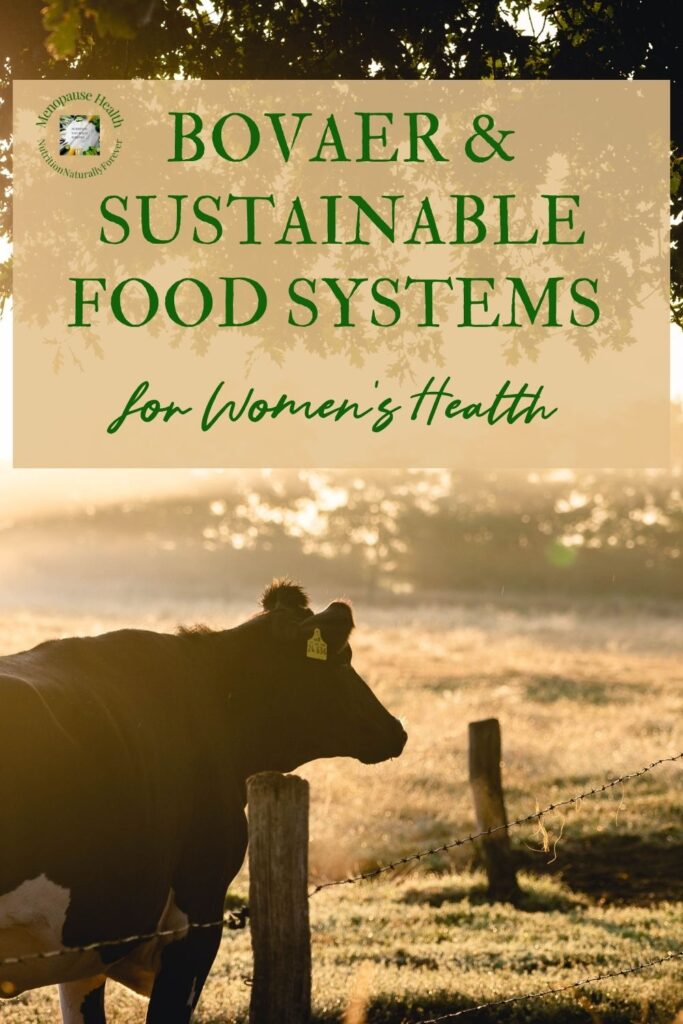
Bovaer & Sustainable Food Systems for Women’s Health.
Are you tired of being told that cows are ruining the planet?
That the food choices you make for your family are to blame for climate change?
Let’s break free from the narrative forced on us by the media, social platforms, and documentaries that ignore a critical truth: the real environmental culprit lies not in nature’s cycles but in the industrial systems we’ve built around them.
Take methane emissions from cows, for instance.
The methane cows release during digestion is part of a biogenic carbon cycle—a natural process that has sustained ecosystems for millennia.
When cows graze and digest fibrous plants, they emit methane.
This methane eventually breaks down in the atmosphere into carbon dioxide and water, which plants absorb during photosynthesis, restarting the cycle.
Unlike fossil fuels, which release “new” carbon locked away for millions of years, this cycle doesn’t add extra carbon to the atmosphere.
Yet we’re being sold industrial “fixes” like Bovaer, a cattle feed additive that promises to reduce methane emissions.
It’s a temporary bandage on a wound created by industrial farming practices, not a long-term solution.
Worse, we don’t fully understand the implications of these “fixes” on cattle health, the environment, or human health.
As women navigating menopause, a time when hormonal health is already delicate, we can’t afford to overlook how these systems affect us.
From the hormones in industrially farmed food production to the misleading claims of plant-based alternatives, it’s time to stop trusting the status quo.
This isn’t just about cows or climate—it’s about women’s empowerment to demand better.
Better food systems. Better health. Better futures for ourselves and our families.
So, let’s dive deeper into the story behind Bovaer, question the narrative, and reclaim control over our food safety and our health.
The Truth About Methane and Cows
Methane has become the villain in modern climate action discussions, with cows cast as the unsuspecting culprits but what’s often left out of the conversation is that methane emissions from cows are part of a natural cycle.
The carbon they release into the atmosphere eventually returns to the earth, completing a cycle that has sustained ecosystems for millennia.
Enter Bovaer, an industrial feed additive designed to reduce methane emissions from cattle.
Its promise?
Cut down methane by disrupting the digestive process in cows.
At first glance, it seems like a win for the environment, but dig deeper, and you’ll find it’s a short-term solution to a problem that stems from industrial farming itself.
Here’s the reality: Bovaer only works as long as cattle consume it consistently.
Stop the feed, and methane levels return to baseline, what about the long-term effects on the health of the cattle?
These are questions that haven’t been fully answered.
The truth is, methane from cows wasn’t a significant issue when farms were smaller, more biodiverse, and aligned with natural cycles creating sustainable agriculture.
The problem isn’t the cows—it’s the industrial farming systems that confine them, feed them unnatural diets, and strip the land of its ability to balance itself.
Rather than masking the symptoms with additives like Bovaer, we need to shift the focus to regenerative farming and environmental sustainability.
This approach prioritises healthy soils, diverse crops, and livestock production as part of a balanced ecosystem.
It’s a solution that supports the planet without compromising the health of animals or the humans who rely on them.
What if instead of buying into the narrative that cows are the problem, we looked at how to restore the natural balance?
By doing so, we could not only reduce methane but also create a healthy life and a more sustainable future for all.
The Hidden Costs of Industrial Farming on Women’s Health
Industrial farming practices don’t just harm the environment, they have profound effects on human health, particularly for women.
The additives, chemicals, and unnatural diets imposed on livestock often translate into hormone-disrupting compounds in the food we consume.
For menopausal women, already navigating a delicate hormonal balance, this can exacerbate symptoms like fatigue, weight gain, poor sleep, painful or prolonged menstrual cycles and mood swings.
One of the most pressing concerns is the rise of synthetic hormones in industrially farmed meat and dairy.
These compounds can mimic or interfere with our natural hormones, contributing to estrogen dominance, experienced by 70% of women without them realising, and a common issue during menopause that can lead to weight gain, heavy bleeding, breast tenderness, and increased risk of certain cancers.

Combine this with the inflammatory effects of ultra-processed foods, seed oils, and artificial additives often found in plant-based alternatives, and the modern food industry starts to look like a minefield for women’s health.
The solution isn’t to eliminate animal products from our diets but to find different ways to prioritise quality over quantity.
Meat, dairy, and eggs from animals raised in natural environments on holistic, regenerative farms not only have higher nutrient densities but also lack the harmful additives and residues of industrially farmed options.
Supporting these systems ensures that the food we eat nourishes our bodies and aligns with our natural hormonal cycles.
We have the power to demand better.
By choosing food from regenerative systems, we’re not just supporting the planet, we’re supporting positive health outcomes for ourselves, our families, and future generations.
It’s time to stop settling for cheap, nutrient-depleted foods and start investing in whole foods that provide real nourishment.
Your body, your hormones, and your family deserve nothing less.
Reclaiming Food Systems for a Resilient Future
With a continually growing population, the global demand for food is projected to rise by 60% by 2050, and the path we choose to meet that demand will define world food security along with the future of our health and the planet.
Industrial farming and quick-fix solutions like Bovaer can’t address the root causes of our broken food systems.
Instead, they perpetuate the cycle of unsustainable practices and nutrient-deficient food.
Resilient, regenerative farming systems offer a better path forward.
These systems focus on biodiversity, soil health, and natural cycles, allowing farmers to produce nutrient-dense food while supporting ecosystems.
When farms prioritise raising animals on their land with the food they grow themselves, they eliminate the need for industrial feed additives and reduce the overall environmental impact.
For menopausal women, nutrient-dense food is more than just sustenance—it’s medicine.
Regenerative farming produces meat, dairy, and plants rich in vitamins, minerals, and good fats essential for hormone balance and overall well-being.
These foods can help combat common menopause symptoms like weight gain, hot flushes, night sweats, and low energy, addressing the root causes rather than masking them with temporary fixes.
Choosing regenerative foods also strengthens local food economies and empowers farmers to invest in sustainable practices.
Paying fair prices for quality food isn’t just an investment in our health, it’s a commitment to a future where food systems work with nature, not against it.
It’s time to reject the narrative that industrial farming is the only solution to feeding the world.
By reclaiming food systems and supporting regenerative agriculture, we can create a resilient future, one where the health of women, families, and the planet takes centre stage.
Empowering Women to Question and Take Action
Women’s participation, especially during menopause, places us at the crossroads of health decisions—for ourselves, our families, and our communities.
Yet, the media, government, and industries continually push narratives designed to confuse, profit from, and disempower us.
Whether it’s the vilification of cows, the glorification of plant-based processed foods, or the promises of industrial quick fixes like Bovaer, the messages are clear: trust us, not yourself.
But here’s the truth: you are the expert on your body and its needs.
No one knows better than you how food makes you feel, how your symptoms manifest, and what your family thrives on.
To regain control, it’s time to push back against the noise and arm yourself with knowledge.
Start by questioning everything:
- Read labels—look beyond the marketing claims. Is that plant-based milk filled with seed oils or additives that harm rather than heal?
- Understand the source of your food—are you supporting regenerative farms or industrial systems?
- Challenge the dominant narratives—is the information you’re hearing backed by holistic science, or is it a tactic to sell you something?
This is not about perfection or following a one-size-fits-all solution.
It’s about listening to your body’s cues and using them as your guide.
If something feels off, investigate.
If a food makes you thrive, lean into it.
Trust your instincts—they are your most powerful tool.
By making intentional choices, you’re not just investing in your own health but in a system that prioritises nutrient density, biodiversity, and sustainability.
This isn’t just about rejecting industrial fixes; it’s about embracing the solutions that nourish your body, protect the planet, and leave a legacy of health and wisdom for the next generation.
You have the decision-making power to reclaim your food, your health, and your future.
Let’s start by asking the right questions, seeking better answers, and turning inward to our innate wisdom. Together, we can challenge the systems that don’t serve us and create a world that does.
A Call to Action for a Healthier Future
The story of Bovaer is a reflection of a much larger issue, industrial solutions to industrial problems that do nothing to address the root causes.
The power to change this narrative lies with us.
By questioning the systems that shape our food and health, we can reclaim control over our choices, our bodies, and our planet.
As menopausal women, with less people-pleasing estrogen and a diminished filter for minding our p’s and q’s, we stand at a powerful intersection. We are responsible for nurturing our families, advocating for better health, and shaping the next generation’s relationship with food.
The choices we make ripple outwards, challenging the status quo and inspiring others to do the same.
Every time we choose nutrient-dense, ethically produced food, we’re casting a vote for a system that values health over profit, sustainability over convenience, and authenticity over marketing.
Let’s reject the narratives that tell us we need quick fixes, processed substitutes, and cheap solutions.
Instead, let’s lean into the wisdom of nature, the resilience of regenerative farming, and the strength of our intuition. By doing so, we create not just healthier lives for ourselves but a legacy of empowerment for future generations.
This is your call to arms: to question, to demand better, and to reclaim the power of choice, not just for our food system but for our menopause health as well.
It’s time to take charge, so we no longer suffer needlessly, lost in the confusion of conflicting advice and quick fixes.
Together, we can nourish our bodies, protect the planet, and craft a food system that truly supports health, harmony, and sustainability.
The journey starts here with one informed, intentional choice at a time, for ourselves, our families, and future generations.

Are you ready to stop feeling lost and start understanding your body during menopause?
The Menopause SHIFT System is your solution.
This program is more than just knowledge—it’s about transformation.
It’s about understanding how your body works, what it needs, and how to care for it holistically.
It’s about creating magic—turning your deepest desires for health, vitality, and harmony into your lived reality.
With the Menopause SHIFT System, you’ll uncover the root causes of your symptoms, learn how to support your hormones naturally and design a vibrant, sustainable lifestyle that aligns with your body’s unique needs.
It’s time to stop suffering needlessly and start living intentionally.
Take the first step toward making your desire for vibrant health a reality.
This 12-week program will be priced at £495, however for the last test run it is half price, £247.50 with the code TEST until 24th December 2024.
The program starts on 6th January 2025. It includes 10 1-2-1 sessions with me and 24/7 access to the online resource hub. To learn more about the program and if it could be a good fit for you view this document.
If you have any questions, contact me via DM or email to chat or arrange a virtual call.
